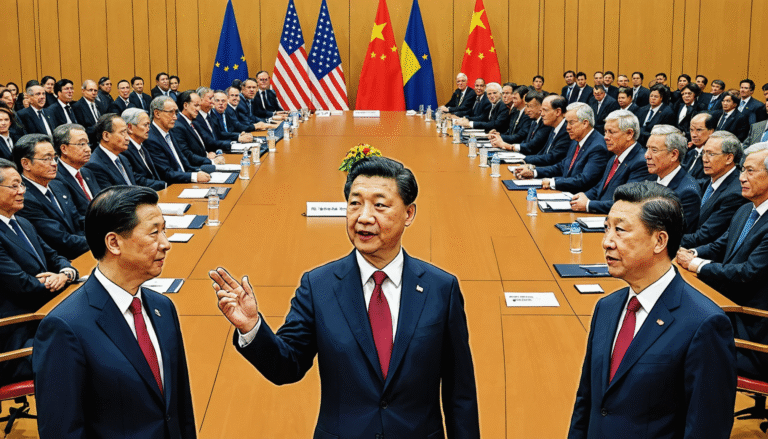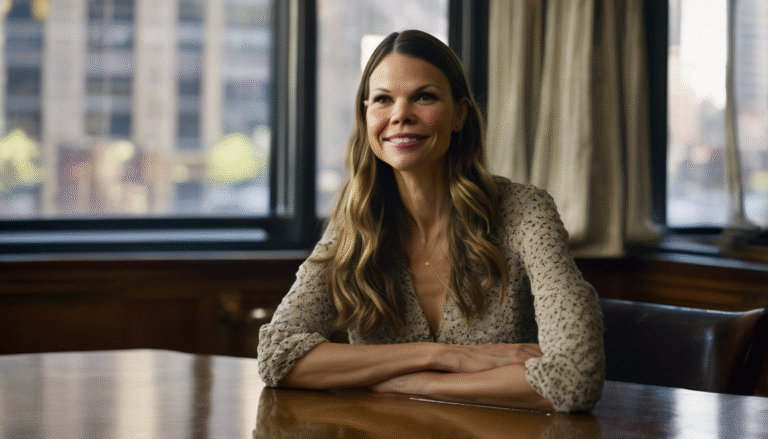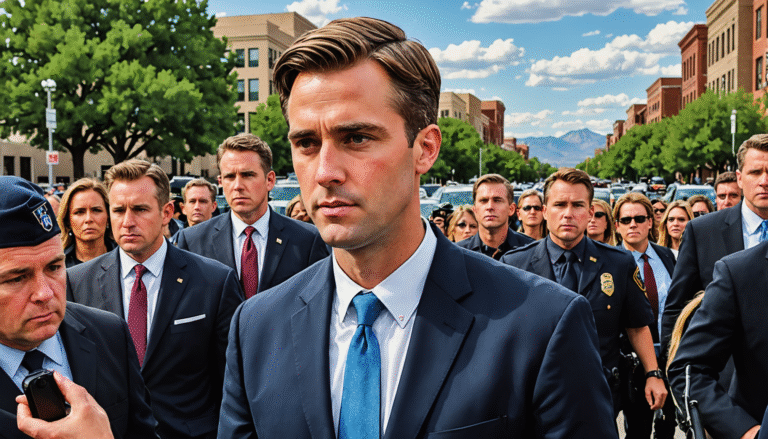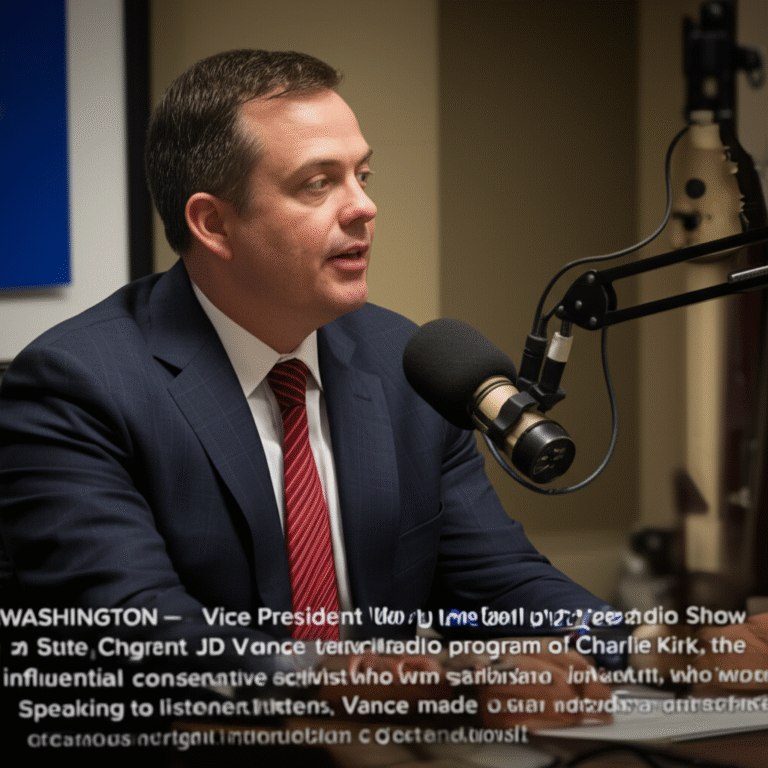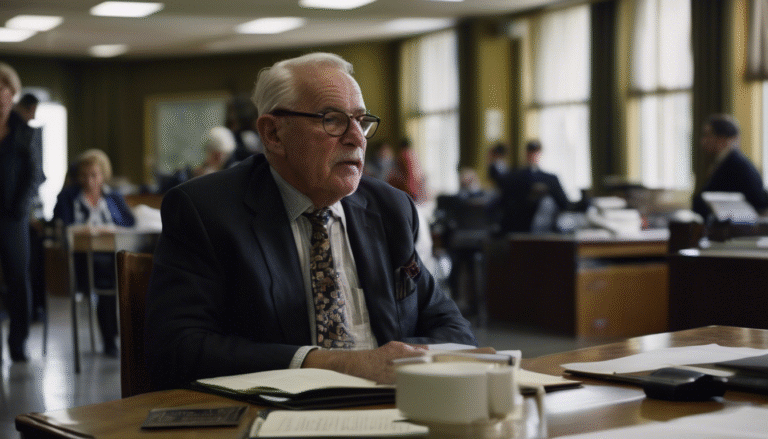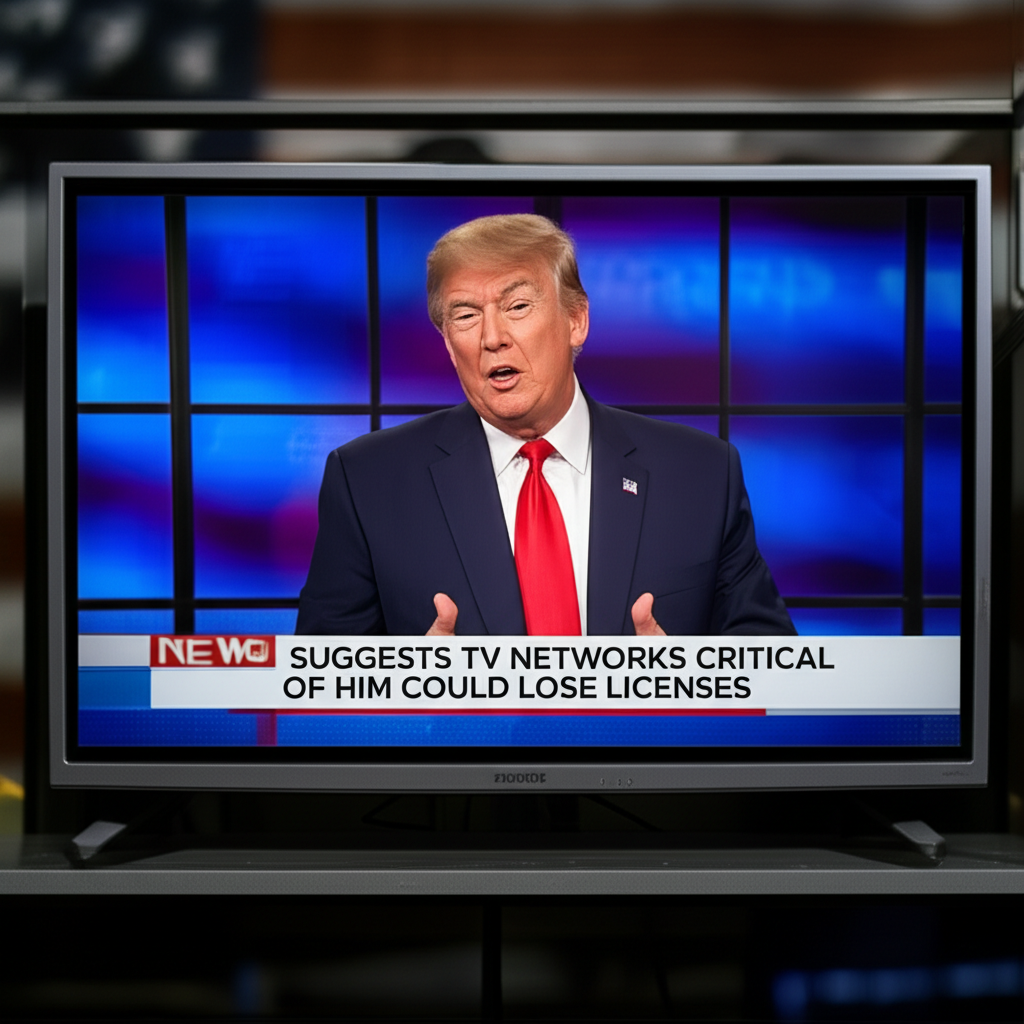
Former President Donald Trump has suggested that television networks featuring overwhelmingly negative coverage of him could have their broadcast licenses taken away. The statement, which has intensified a debate over free speech and potential government censorship, was made in the wake of ABC’s decision to suspend “Jimmy Kimmel Live!” This issue of Trump TV licenses came to the forefront after Trump was questioned by reporters aboard Air Force One while leaving the United Kingdom following a state visit. The controversy stems from on-air comments made by host Jimmy Kimmel regarding the recent fatal shooting of conservative activist Charlie Kirk, a prominent ally of the former president.

Mr. Trump’s remarks directly linked the renewal of broadcast licenses to the nature of media coverage he receives. “I read someplace that the networks were 97% against me. I get 97% negative … and if they’re 97% against and they give me only bad publicity, press, and they’re getting a licence, I would think maybe their licence should be taken away,” he stated. The former president specifically targeted late-night talk shows, which he characterized as uniformly hostile towards him. He accused these programs of being an extension of the Democratic Party, claiming, “All they do is hit Trump, that’s all they do.” He further argued that this type of programming is not permissible for licensed broadcasters. “If you go back and you see they haven’t had a conservative on in years, I think somebody said, when you go back take a look, all they do is hit Trump,” he told reporters. “They’re licensed. They’re not allowed to do that. They are an arm of the Democrat Party.”
The Catalyst: Jimmy Kimmel’s Suspension
The immediate context for the former president’s comments was the decision by the U.S. network ABC to pull “Jimmy Kimmel Live!” from its broadcast schedule. This move has been met with widespread criticism and accusations of government censorship, drawing condemnation from numerous Hollywood figures and free speech advocates. The suspension followed comments Kimmel made during his show earlier in the week. Addressing his audience, Kimmel spoke about the shooting of Charlie Kirk, stating that the “Maga gang are desperately trying to characterise this kid who murdered Charlie Kirk as anything other than one of them.” He also responded to a video of Trump saying he was doing “very good” after Kirk’s death, with Kimmel remarking, “this is not how an adult grieves the murder of someone they call their friend.” These comments drew a sharp response, including from regulatory figures.
Widespread Condemnation from Entertainment and Politics
The suspension of Kimmel’s show and Trump’s subsequent remarks have triggered a unified response from the late-night television community and beyond. Fellow comedians used their own platforms to criticize ABC’s decision and express solidarity with the host. Stephen Colbert was particularly direct in his criticism during Thursday’s episode of “The Late Show.” His show’s official Instagram account had previously posted a message stating, “The Late Show stands with Jimmy Kimmel and his staff.”
“People across the country are shocked by this blatant assault on the freedom of speech,” said Colbert.
It was noted that Colbert’s own show on CBS is scheduled to end next year, a decision the network attributed to financial reasons. This announcement from CBS came after Colbert had criticized a settlement between Trump and the network’s parent company concerning a “60 Minutes” story. Other hosts employed satire to make their point. Jon Stewart hosted a special edition of “The Daily Show” where he portrayed a “patriotically obedient host,” sarcastically admonishing his audience for booing video clips of Trump. In his closing monologue, Stewart highlighted the view that the administration’s concerns about speech were a cynical ploy, a “smokescreen to obscure an unprecedented consolidation of power and unitary intimidation.”
A United Front from Comedians and Public Figures
On NBC, “Late Night with Seth Meyers” adopted a similar satirical tone. Meyers told his audience, “The (Trump) administration is pursuing a crackdown on free speech … completely unrelated, I just want to say before we get started here that I’ve always admired and respected Mr. Trump.” He continued the bit by praising Trump as a “visionary” and a “great president,” adding, “if you’ve ever seen me say anything negative about him, that’s just AI.” Jimmy Fallon, host of “The Tonight Show,” offered a more personal reflection. “To be honest with you all, I don’t know what’s going on — no-one does,” Fallon said. “But I do know Jimmy Kimmel and he is a decent, funny and loving guy. And I hope he comes back.”
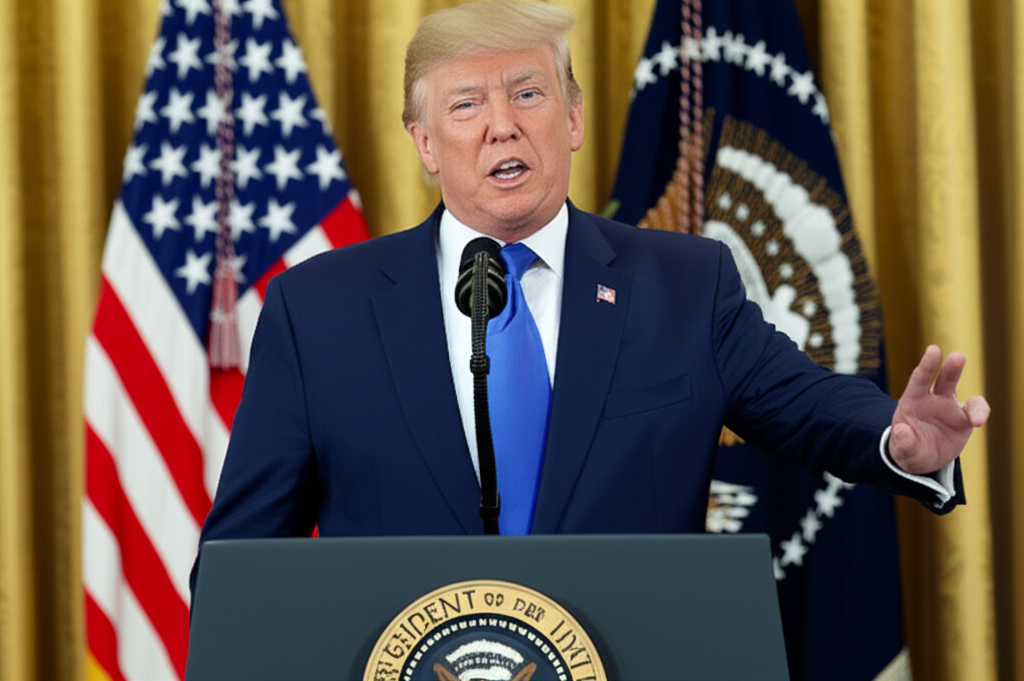
The criticism extended to veteran figures as well. Former long-time late-night host David Letterman labeled Kimmel’s suspension “ridiculous.” Speaking at The Atlantic Festival in New York, the 78-year-old expressed his concern about the direction of the media landscape. “I feel bad about this, because we all see where this is going, correct?” he asked. “It’s managed media. It’s no good. It’s silly. It’s ridiculous.” Letterman also defended the right to be critical of those in power, stating that people should not be fired for refusing to “suck up” to what he termed “an authoritarian” president.
- Donald Trump suggested revoking licenses for TV networks with “97% negative” coverage.
- The controversy began after the ABC network suspended the airing of “Jimmy Kimmel Live!”.
- Kimmel’s suspension followed his on-air comments on the death of conservative activist Charlie Kirk.
- Former President Barack Obama called the situation an example of government coercion against free speech.
- The FCC Chairman stated broadcasters must serve the public interest or can turn in their licenses.
Former President Barack Obama also weighed in, suggesting the issue represented “precisely the kind of government coercion that the First Amendment was designed to prevent.” In a social media post, Obama wrote, “After years of complaining about cancel culture, the current administration has taken it to a new and dangerous level by routinely threatening regulatory action against media companies unless they muzzle or fire reporters and commentators it doesn’t like.” The sentiment was shared by many famous personalities, including Ben Stiller and Jamie Lee Curtis, who used social media to voice their support for free speech. The Screen Actors Guild–American Federation of Television and Radio Artists (SAG-AFTRA) also released a statement, saying, “The decision to suspend airing Jimmy Kimmel Live! is the type of suppression and retaliation that endangers everyone’s freedoms.”
Regulatory Response from the FCC
While criticism has been widespread, Kimmel’s comments also drew a response from the Federal Communications Commission (FCC). Chairman Brendan Carr, speaking to Fox News on Thursday, indicated that the agency would take action. Carr stated that the FCC was “going to continue to hold these broadcasters accountable to the public interest.” He further elaborated on the power the agency holds over broadcast licenses, adding a pointed message to networks. “If broadcasters don’t like that simple solution, they can turn their licence in to the FCC,” he said. This statement has been interpreted by critics as echoing the political pressure being applied to media outlets, raising concerns about the impartiality of the regulatory body in the face of political disputes over news coverage and commentary. The focus on holding broadcasters accountable has amplified fears of politically motivated regulatory actions regarding **Trump TV licenses**.
Background
The series of events was set in motion by the death of Charlie Kirk, a prominent conservative political commentator and a known ally of the former president. Kirk was shot and killed during an event at Utah Valley University last week. In connection with the killing, a 22-year-old named Tyler Robinson was charged on Tuesday. If convicted of the crime, Robinson could potentially face the death penalty. It was in the aftermath of this event that Jimmy Kimmel made his remarks on his late-night program, which ultimately led to the network’s decision to suspend the show and provided the context for reporters to question Trump on the matter, eliciting his comments about broadcast licenses.
What’s Next
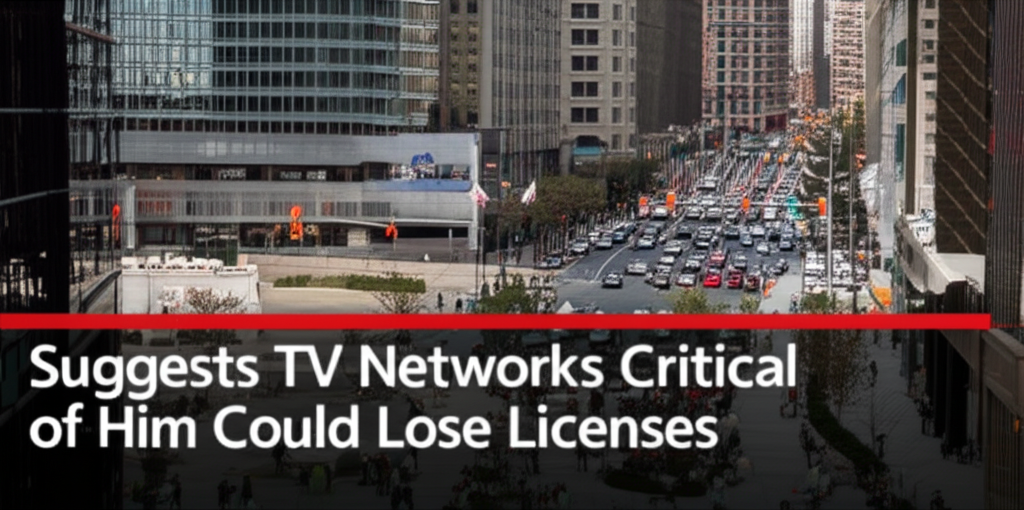
The situation has evolved into a significant flashpoint in the ongoing debate over free speech, media responsibility, and the potential for government overreach. The explicit threat from a major political figure to use regulatory power to punish media outlets for unfavorable coverage marks a serious escalation. The path forward will likely be defined by the actions of media corporations, the resolve of journalists and commentators to resist pressure, and the stance of regulatory bodies like the FCC. The comments from FCC Chairman Brendan Carr suggest a willingness to enforce a “public interest” standard, a term that free speech advocates worry could be wielded subjectively to chill dissent and critical reporting. The strong and unified front presented by figures across the entertainment industry and political spectrum in defense of the First Amendment indicates that any perceived attempts at censorship will continue to be met with significant public resistance. [Source]


